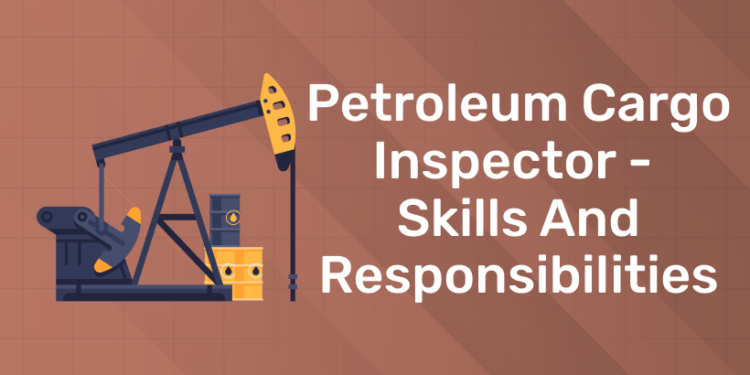Table of Contents
A Petroleum Cargo Inspector is responsible for ensuring the accurate measurement and transfer of petroleum products during loading and unloading operations. They play a crucial role in maintaining safety and quality standards in the transportation of oil and gas. In this article we will discuss: Petroleum Cargo Inspector- Skills and Responsibilities.
Petroleum Cargo Inspector- Skills and Responsibilities
Petroleum Cargo Inspector ensures the proper loading and unloading of oil and gas products during transfer. They are also skilled at using the equipment to measure the quality of the materials. They make sure that everything is carried out as per the rules.
Skills
The skills required to become a Petroleum Cargo Inspector:
Measuring Ability:
- Can use tools to measure accurately.
- Knows how to calculate and report measurements.
Paying Attention:
- Notices small details.
- Makes sure everything is done right.
Safety Understanding:
- Knows and follows safety rules.
- Keeps the workplace safe.
Sampling Knowledge:
- Knows how to take product samples correctly.
- Understands why sampling is important.
Handling Equipment:
- Can use and take care of inspection tools.
- Makes sure tools work well.
Writing Skills:
- Can write down inspection findings accurately.
- Keeps good records of measurements.
Talking and Listening:
- Can talk well with team members and others.
- Shares information and works together during inspections.
Problem-Solving:
- Can find and fix problems during inspections.
- Solves issues to keep things running smoothly.
Knowing the Rules:
- Understands industry rules and standards.
- Makes sure inspections follow the law.
Teamwork:
- Works well with others in a team.
- Helps colleagues during inspections.
Unlock exclusive training opportunities! Explore limited-time oil & gas programs!
Responsibilities
Responsibilities of a Petroleum Cargo Inspector are:
Measurement:
- Accurately measure quantities of petroleum products.
Quality Check:
- Ensure product quality meets standards.
Sampling:
- Collect samples for testing.
Safety:
- Follow safety protocols.
Equipment Care:
- Maintain and calibrate tools.
Documentation:
- Record inspection details.
Communication:
- Communicate effectively with team.
Problem-Solving:
- Resolve issues during inspections.
Compliance:
- Ensure adherence to regulations.
Teamwork:
- Collaborate with colleagues.
Qualification:
Qualification required to become Petroleum Cargo Inspector are:
Education:
- High school diploma or equivalent.
Training/Certification:
- Completion of relevant training or certification programs.
- Brief Overview of Entri’s Oil and Gas Training Course:
- Major global and Indian sector with significant economic impact.
- Diverse career opportunities nationally and internationally.
- Enhances career prospects in oil, gas, and renewable energy.
- Can be pursued alongside current job or as a fresher.
- Training by industry professionals.
- Self-paced learning available in Malayalam.
- Includes live projects and job-oriented curriculum.
- Full-time assignment support team.
- Soft skill sessions provided.
Get Certified! Get Confident! Join our Oil and Gas Course!
Experience:
- Previous industry experience preferred.
Technical Skills:
- Proficiency in measurement tools and industry software.
Safety Knowledge:
- Understanding of safety procedures and regulations.
Communication Skills:
- Effective verbal and written communication.
Attention to Detail:
- Keen attention to accuracy.
Problem-Solving Skills:
- Ability to resolve issues efficiently.
Regulatory Understanding:
- Knowledge of industry regulations.
Teamwork:
Collaboration skills for working in teams.
Average Salary
1: What is the primary purpose of a refinery in the oil and gas industry?
The average annual salary of a Petroleum Cargo Inspector may vary with location:
| Location | Average Salary Range (INR) |
| India | INR 3,00,000 – INR 8,00,000 |
| Mumbai, India | INR 4,00,000 – INR 10,00,000 |
| Delhi, India | INR 3,50,000 – INR 9,00,000 |
| Chennai, India | INR 3,00,000 – INR 7,50,000 |
| Kolkata, India | INR 3,00,000 – INR 7,00,000 |
| Bangalore, India | INR 3,50,000 – INR 8,50,000 |
| Abroad (USA) | $40,000 – $80,000 (approx.) |
| Abroad (UK) | £30,000 – £60,000 (approx.) |
| Abroad (UAE) | AED 120,000 – AED 250,000 |
| Abroad (Australia) | AUD 70,000 – AUD 120,000 |
Career growth
Career Growth Chart of a Petroleum Cargo Inspector:
Entry-Level Petroleum Cargo Inspector:
Responsibilities:
- Measure cargo quantities accurately.
- Assist with sampling and quality checks.
- Follow safety procedures and guidelines.
Salary:
- INR 3,00,000 – INR 4,50,000 per year.
Mid-Level Petroleum Cargo Inspector:
Responsibilities:
- Conduct cargo inspections independently.
- Coordinate with team members and stakeholders.
- Ensure compliance with regulations.
Salary:
- INR 5,00,000 – INR 7,00,000 per year.
Senior Petroleum Cargo Inspector:
Responsibilities:
- Lead inspection teams and oversee operations.
- Train and mentor junior inspectors.
- Manage documentation and reporting.
Salary:
- INR 8,00,000 – INR 10,00,000 per year.
Supervisory/Managerial Roles:
Roles & Responsibilities:
- Manage entire inspection department or division.
- Develop and implement strategic plans.
- Co-operate with senior management and clients.
Salary:
- INR 12,00,000 and above per year.
Director/Executive Positions:
Roles & Responsibilities:
- Oversee multiple departments or regions.
- Set organizational goals and policies.
- Represent the company at industry events.
Salary:
- INR 20,00,000 and above per year.
Advantages
Advantages of Becoming a Petroleum Cargo Inspector:
Varied Work Environment:
- Work in diverse settings like terminals, refineries, ports, and offshore sites.
Industry Stability:
- Steady demand for petroleum products ensures job stability.
Hands-On Experience:
- Gain practical skills in cargo inspection and quality control.
Career Growth Opportunities:
- Advance through experience, certifications, and further education.
Competitive Salaries:
- Earn competitive pay, especially with experience.
Global Opportunities:
- Chance for international assignments due to the industry’s global nature.
Critical Role in Supply Chain:
- Ensure safe and efficient petroleum transportation.
Job Satisfaction:
- Feel fulfilled by ensuring accuracy and safety in cargo transfers.
Continuous Learning:
- Stay updated with industry regulations and technology.
Contribution to Industry:
- Support various sectors of the economy through reliable transportation.
Limitations
Limitations of Becoming a Petroleum Cargo Inspector:
Physical Demands:
- Job can be tiring and involve heavy lifting.
Safety Risks:
- Work with hazardous materials in unsafe environments.
Environmental Impact:
- Handling petroleum products may harm the environment.
High Stress Levels:
- Dealing with strict rules and tight schedules can be stressful.
Limited Advancement:
- May need extra education for career growth.
Weather Dependence:
- Work may be affected by bad weather.
Regulatory Challenges:
- Keeping up with changing rules can be hard.
Shift Work:
- Irregular hours may disrupt personal life.
Accident Risk:
- Job involves risks like spills and accidents.
Responsibility Pressure:
- Responsible for accurate and safe cargo transfers, which can be pressure-filled.
How to Become a Petroleum Cargo Inspector
Education:
- Get a high school diploma or equivalent.
Experience:
- Start with entry-level jobs in the petroleum industry.
Training:
- Complete a cargo inspection or petroleum operations training program.
Technical Skills:
- Learn to use measurement tools and industry software.
Safety Training:
- Understand safety rules and get necessary certifications.
Communication Skills:
- Practice speaking and writing clearly.
Attention to Detail:
- Pay close attention to accuracy in measurements and records.
Problem-Solving Abilities:
- Learn to solve issues that come up during inspections.
Regulatory Knowledge:
- Stay updated on industry rules and standards.
Networking:
- Build connections in the industry for job opportunities.
Apply for Jobs:
- Look for openings and apply with a tailored resume.
Certification:
- Consider getting certified in oil and gas to boost credentials.
Continued Learning:
- Stay updated with new technology and regulations.
Petroleum Cargo Inspector- Skills and Responsibilities: Conclusion
In this blog we have discussed everything you needed to know about a Petroleum Cargo Inspector. His/her roles and responsibilities. The skill set and qualifications to become one. Its limitations and advantages.
Frequently Asked Questions
What skills are required to become a Petroleum Cargo Inspector?
Skills needed include proficiency in measurement tools, attention to detail, safety awareness, communication abilities, problem-solving skills, and regulatory knowledge.
What are the primary responsibilities of a Petroleum Cargo Inspector?
Responsibilities include accurately measuring cargo quantities, ensuring product quality, collecting samples, adhering to safety protocols, maintaining equipment, documenting inspection findings, and communicating effectively with team members and stakeholders.
How can I develop the necessary skills to become a Petroleum Cargo Inspector?
You can develop skills through training programs, gaining relevant experience, obtaining certifications, and staying updated with industry regulations and best practices. Additionally, practicing attention to detail, communication, and problem-solving in various work environments can be beneficial.










